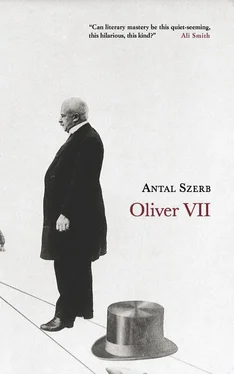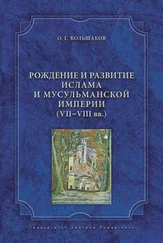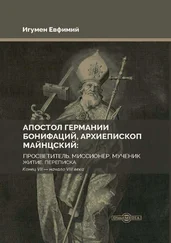He plucked the picture out of Sandoval’s hands and disappeared with astonishing speed into the next room.
“That was an excellent idea,” said Clodia. “Let’s hope he hasn’t forgotten it by the morning.”
“Your Highness, I shall leave you the National Gallery catalogue. Please study it carefully. If the Duke seems to be losing interest, just repeat one or two little propositions: Fouquet … Boltraffio. And a genuine Van Eyck.”
He left the mansion soon after. Once inside the taxi, he sank into a pleasant daydream.
The calendar pursued its relentless course, and the next day was indeed the eighth of April. In the morning Sandoval reported to the revolutionary committee in the Barrel-Makers Joint Stock Trading Company building, and learnt that the whole plan was moving punctually towards its goal. On early morning trains, on foot, in hay-wagons and specially hired coaches, a mighty throng of aggrieved fishermen and winegrowers had arrived in the capital and been lodged in garages, cellars and attics, to keep them out-of-sight until the moment of action arrived. Meanwhile the Twelfth Regiment was on duty at the palace.
Even the streets had taken on an unusual appearance. The presence of flags flying to mark the next day’s royal wedding lent them a festive air. Everywhere banners, garlands of flowers and other insignia lauded King Oliver VII and his bride-to-be, Princess Ortrud. Sandoval was visited by the strange, oddly perverse feeling that this carnival atmosphere, created ostensibly to honour the King, would in fact prepare the way for his dethronement. Inside the great Westros department store he noted the huge portraits, seemingly made from entire rolls of silk and broadcloth, of the King and Princess, and he shuddered to think of the ironic workings of destiny. A great many shops and businesses were closed — officially for the approaching celebration, but actually because the owners feared for the safety of their windows and warehouses in the events that were about to unfold.
On the afternoon of that memorable day a ministerial council of the highest importance was taking place in the royal palace. The moment had arrived for the signing of Finance Minister Pritanez’s great work, the Coltor Treaty.
They had been in session for quite some time, deliberating every detail before the arrival of the King. The Minister for Internal Affairs was concerned about reports he was receiving of serious unrest across the country. The Prime Minister remained optimistic:
“Nonsense; this is Alturia, remember. Our people are always hatching plots and conspiracies, and in the end everything stays exactly as it was. Think of the time when Balázs II or the Unfortunate was strung up by the heels. They took him down five minutes later, and he continued to rule to general acclaim.”
At that moment King Oliver entered the chamber, accompanied by his aide-de-camp, Major Mawiras-Tendal. The King, who is in fact the hero of our history, is a young man of twenty-four, with a handsome, rather dreamy face, one that might seem perfectly at home on an athletics track or in a nightclub, or, come to that, since its finely formed brow betrays an unusual intelligence, in the comfortable room of a library hung with portraits. Here, among the stern and generally rather misshapen features of his fellow countrymen, he seems somehow out of place. The incongruity of his appearance is intensified by the uniform he is wearing. It is a field marshal’s greatcoat, magnificent, severe and severely old-fashioned, with high-winged collars. It visibly restricts his every movement, and weighs no less heavily on his mind. He is forever complaining about having to wear it: “I can’t get comfortable in it,” he insists. “It’s like sitting on a cactus, or as if I’d become a cactus myself.” But tradition decrees that he can never take it off. The kings of Alturia have gone about in full field marshal regalia ever since one of their ancestors, Philip II or the One-Eared, suffered the indignity of having his enemies burst in upon him while he was wandering down a palace corridor in his nightshirt.
The King greeted each of his ministers in turn, then withdrew with his Prime Minister and Minister of the Interior for a private discussion.
“Your Highness,” the Prime Minister began, “this is a rather delicate matter, and a rather bold step to take, but we believe that Your Highness’ aide-de-camp, Major Mawiras-Tendal, is not a suitable person to be carrying out a duty of trust beside Your Highness in critical moments like these.”
“Mawiras-Tendal not suitable? What possible objection can there be to him? He’s a first-class soldier, and an even better friend.”
“Your Highness,” the Interior Minister interposed, “I’m afraid that — from confidential reports — we are only too well informed of the Major’s political views. He is in contact with the leaders of the opposition press, and, worse, with the fire-eating Delorme himself. He is in regular correspondence with political exiles abroad. Besides all this, he is the grandson of our national hero, whose sole bequest to us as a people was a predisposition to anarchy.
“This would be a highly suitable moment to get rid of him,” the minister continued. “The post has become vacant of Director of the State Mercury Mines. Poor Colowar died the day before yesterday, of poisoning.”
“Mercury poisoning?” the horrified King asked.
“No, alcohol poisoning. Mawiras-Tendal would be just the person to replace him.”
“My dear sirs, we cannot possibly discuss this now. How could you think it? You surely know that I would part with anyone rather than my old Milán. He’s the best person for the job, and my most sincere friend. But if you wish, we can talk about it tomorrow, or the day after.”
“Why only then?” asked the Prime Minister, dumbfounded.
“Because by then so much will have changed. I shall be a married man. But meanwhile we have a duty to perform. Could we please get it over and done with? Let’s swallow the bitter pill, and put our names to this famous treaty.”
Everyone took his appointed place round a large circular table. The Finance Minister once again summarised the significance of the document while the others sat in a bored, restless silence waiting for the decisive moment of signing. Their restlessness stemmed from a shared feeling that the King’s good breeding and seeming impartiality might well conceal some inscrutable, deeply impractical character — some unsuspected trait lurking beneath his general good sense. That he might, at the very last minute, change his mind.
But that did not happen.
Having listened carefully to all they had to say, he asked, in the most natural voice in the world:
“So, you gentlemen are all agreed that the country has no other means of salvation than for us to ratify this loathsome, humiliating treaty?”
“That is so,” the Prime Minister answered. “If Your Highness does not sign it, and we fail to secure Coltor’s advance payment, we might as well close down the Treasury and lock up the Chancellor. That is the stark reality.”
“And you gentlemen are prepared to share with me the odium that will attach to this, that you … to put it politely …? Well, you know what I am thinking.”
“We shall stand by Your Highness to the last drop of our blood,” the Prime Minister averred.
“We will give our all,” the Minister for the Interior chimed in, “to the last drop of wine and the very last sardine.”
“I do not doubt it. Then I can hesitate no longer. I shall go down in history as the king for whom no sacrifice was too great. Kindly pass the document so that I may sign.”
They watched, each man mouthing a prayer, as the King, very slowly, inscribed his name, and then stood for another moment, gazing in wonder at what he had written.
Читать дальше












